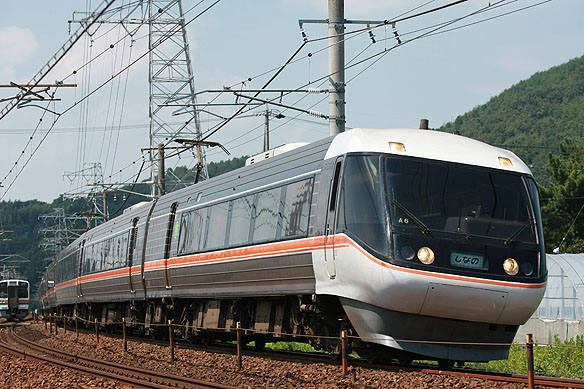JR Central developed 383 series tilting electric multiple unit (EMU) train
type in order to shorten the required time and improve passenger's accommodation
in 1994, since 381 series, which had been used on "Shinano" services
linking Nagoya and Nagano, were superannuated. 383 series adopt AVAF inverter
control system to achieve the improvement of maximum service speed and
acceleration performance. 383 series adopt 2 car unit consisted of 1 motored
car and 1 trailer car. 383 series are equipped with tilting system with
electrical control to raise their speed at a curve and improve comfort
to ride. All air conditioners, including those of motored cars, are fitted
under the floor in order to make their centre of gravity lower.
Bolster-less air suspension bogies, C-DT61A/C-TR245A, are equipped with built-in bearing guides, which have lower frictional resistance than 381 series, for body tilting system, and equipped with yaw dampers to ensure smooth ride characteristics even at high speed. Moreover, C-DT61A/CTR245A is self-steering bogie in order to reduce lateral force in travelling at a curve. 383 series adopt mixed regenerative-dynamic braking under low possibility of regeneration.
The lightweight stainless steel body is adopted. The 1st class end cars towards Nagano are observation cars, and the other end cars are equipped with the through door in front of the bodies. All seats are adjustable reclining. 1st class vehicles have 2+2 abreast seating and seat pitch is 1200mm and standard class vehicles have 2+2 abreast seating and seat pitch is 1000mm.
Mass production vehicles were delivered in 1996. There are 2-car formation and 4-car formation besides 6-car formation.
Now 383 series are used on "Shinano" services linking Nagoya and Nagano.
|
|



